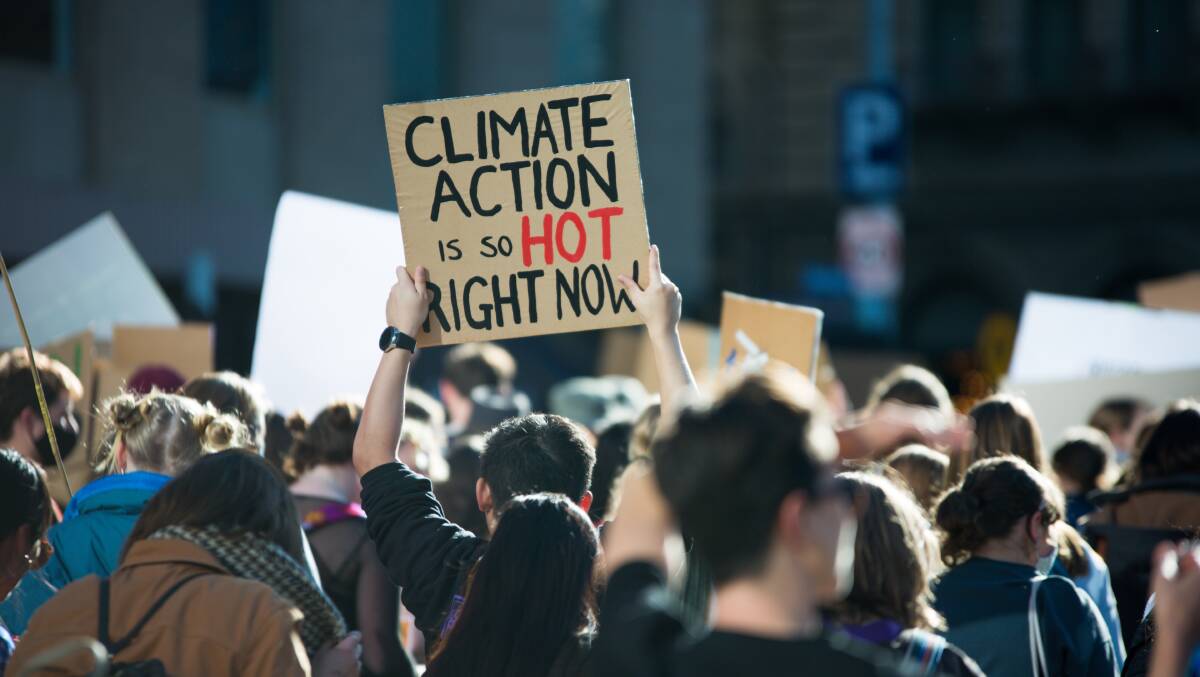The biggest risk to Australia's future is not a priority for either side of politics in Australia, and that's a problem for all of us.
Both the government's and the opposition's security narratives are that China is the greatest threat to our future. It's man-made. Hence we have AUKUS, the Quad, continual regional hand-shaking, more joint military exercises, the illusion of nuclear-powered submarines and an enhanced US presence in Australia's north where bases are being expanded.
But this narrative represents siloed thinking on security. It does not align well with international perceptions. The World Economic Forum's 2023 survey of public and private sector global leaders found that the biggest three risks in the coming decade were all climate-related, whilst "geo-economic confrontation" (read: China) came in ninth.
Climate Scorpion, a new report by the UK Institute and Faculty of Actuaries, says that often governments are loath to include potentially catastrophic issues like climate change in their risk thinking because they are "too big" and scary to handle. Governments and people tend to focus on short-term opportunities rather than looking at longer-term risks.
The report says that, despite warnings, if one were to ask government officials anywhere for their view of the risk of global catastrophe, the response would be "thunderous silence" because these worst-case scenarios are "out of the realms of imagination and the time frames of politics".
And so here we are more complacent than most. Let's see why. In Australia, the new 80-page National Defence Strategy (NDS) contains just two sentences of substance on climate's impact in "amplifying existing stressors across the region, such as poverty, food security and cross-border migration and displacement. These effects may also intensify transboundary tensions and have impacts on Australia's national security."
But exactly how that impact will affect Australia and how Australia will practically respond to its effects is not discussed. It was the same with the Defence Strategic Review last year.

Whilst the NDS focus on military hardware and war-fighting capability is understandable given the escalation in conflict globally, the NDS fails to recognise that the rapid acceleration of climate impacts through 2023 confirms that climate is a far greater threat for all nations. It demands a fundamental recalibration of security and defence thinking.
Whilst Pacific governments, the UN Secretary General and the US Defence Secretary all agree that climate breakdown is an existential risk, the NDS chooses to ignore it. When think-tanks of Australia's allies were warning that cascading climate impacts will drive regional and international conflict, preparing for and mitigating this security risk was noticeably too hot to handle for Australian governments.
In a hotter world, some parts of the earth, presently inhabited, will become practically unlivable due to extreme temperatures combined with high humidity. They will likely de-populate significantly. Those areas include Amazonia, around the Red Sea and the Persian Gulf, stretching to parts of south and south-east Asia, much of Indonesia and areas of northern Australia and Papua New Guinea. The UN predicts a future of substantial mass-migrations across borders.
Climate disruption now presents a catastrophic threat to society and human security. In vulnerable countries such as Sudan and across the Sahel, it has contributed to the collapse of governments and civil wars erupting, forcefully displacing millions searching for a safe haven.
Inadequate assessment by a succession of Australian governments has left our nation with a poor understanding of the looming climate risks, and poorly prepared to face the consequences. Australia remains "missing in action" on climate-security risks, with climate downplayed to a cameo role in defence and security policy and planning, whilst the government oversees the expansion of the gas export industry.
Is this the consequence of decades of political "climate wars" and the power of the fossil fuel lobby? It may be to some extent. But, it is also a product of a systemic failure of leadership across government and business where leaders seem to lack the imagination and the capacity to "think outside the box".
How many of those leaders actually grasp the risk of ruin in their decision-making? There is no better example in relation to climate than former Royal Dutch Shell CEO Ben van Beurden's admission:
"Yeah, we knew. Everybody knew. And somehow we all ignored it."
Stripped of climate expertise by the previous government, the Australian Public Service has barely enough capacity to understand, coordinate or advise appropriately on the full range of climate risks. It will take years of effort to rebuild this lost capacity across the government. And climate research is not planned or integrated sufficiently to be accepted for delivering what the government needs for realistic risk assessment and policy-making.
But these problems can be fixed without great expense or provoking political war.
Together with my colleagues at the Australian Security Leaders Climate Group, we have made a number of modest, affordable and politically non-contentious suggestions to make the government fit-for-purpose in understanding these risks - overcoming the bureaucratic silos, establishing a dedicated Climate Threat Intelligence unit, establishing an Abrupt Climate Change Early Warning System and legislating a Global Catastrophic Risk Management Act.
The failure to take these basic steps now would be another form of climate denial, of turning a blind eye to the future that Australia faces because the issue is "too big" to handle.
- Admiral Chris Barrie AC (retd), an Executive Committee member of the Australian Security Leaders Climate Group.

